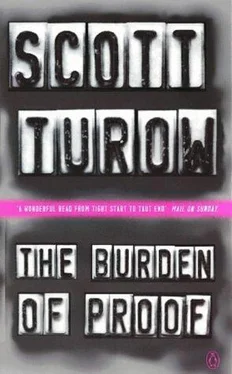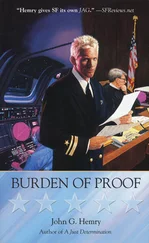Scott Turow - The Burden of Proof
Здесь есть возможность читать онлайн «Scott Turow - The Burden of Proof» весь текст электронной книги совершенно бесплатно (целиком полную версию без сокращений). В некоторых случаях можно слушать аудио, скачать через торрент в формате fb2 и присутствует краткое содержание. Жанр: Детектив, на английском языке. Описание произведения, (предисловие) а так же отзывы посетителей доступны на портале библиотеки ЛибКат.
- Название:The Burden of Proof
- Автор:
- Жанр:
- Год:неизвестен
- ISBN:нет данных
- Рейтинг книги:3 / 5. Голосов: 1
-
Избранное:Добавить в избранное
- Отзывы:
-
Ваша оценка:
- 60
- 1
- 2
- 3
- 4
- 5
The Burden of Proof: краткое содержание, описание и аннотация
Предлагаем к чтению аннотацию, описание, краткое содержание или предисловие (зависит от того, что написал сам автор книги «The Burden of Proof»). Если вы не нашли необходимую информацию о книге — напишите в комментариях, мы постараемся отыскать её.
The Burden of Proof — читать онлайн бесплатно полную книгу (весь текст) целиком
Ниже представлен текст книги, разбитый по страницам. Система сохранения места последней прочитанной страницы, позволяет с удобством читать онлайн бесплатно книгу «The Burden of Proof», без необходимости каждый раз заново искать на чём Вы остановились. Поставьте закладку, и сможете в любой момент перейти на страницу, на которой закончили чтение.
Интервал:
Закладка:
The general pattern of results, and the evidence, seldom merited that; and he found clients easier to satisfy if he had dampened their expectations. He replaced the phone in that mood of conflict, reminding himself that this was, after all, his sister, her husband.
Stern found a copy of the grand jury subpoena in the in box on the cabinet behind his desk. He reread it and Dixon came to stand over his shoulder, bringing Stern's humidor with him. In the office, Stern usually lit his first cigar by nine-thirty or ten in the morning, and one was always burning thereafter until he left for the day. Clara had never approved. She complained about the odor in his clothing and on his hands and during an exceptional period of high irritability some years ago had refused to permit cigars inside their home. The humidor had been his father's, inlaid with mother-of-pearl and lined in velvet; his father, a quiet, proper man of fragile character, had placed great stock in certain objects. Stern looked into the humidor with admiration, but for the moment some freighted sense of obligation toward Clara caused him to decline.
"What does this show you?" Dixon asked., tapping the subpoena.
Stern, still reading, lifted a hand. To the first page of the subpoena was stapled a lengthy attachment describing the documents the government sought. Dixon, on behalf of his company and subsidiaries, was required to produce a variety of records-order tickets, Wading cards, clearing documents-relating to a lengthy list of futures trades.
The transactions, identified by date, commodity, number of contracts, month of delivery, and customer account, seemed to have been listed at random. The columns of figures marched down half the page, but the wades appeared to have been sorted neither chronologically nor by client. Stern counted for a moment. There were thirty-seven transactions.
"Let us start from the beginning, Dixon. Tell me about these documents.
How are they generated?"
"You understand my business, Stern."
"Indulge me," he answered. The truth, of course, was that he could keep none of it straight. Other lawyers-a huge finn with offices here and in Chicago-attended to Dixon's regular business affairs. Stern learned what little piece he needed to deal with each problem that came his way and, at its conclusion, let all of it-practices, regulations, terms of art-fly from his mind, as in the aftermath of an exam. Oh, he knew the rudiments, the definitions: a futures contract was a transferable obligation to buy or sell a standard amount of a particular commodity for an agreed price at a fixed date in the future. But the markets had moved well past the point they were at when Dixon had started decades ago, and only farmers sold futures to secure harvest prices. Today the play, as Dixon put it, was in money; the markets sold futures on the markets: on bond and currency prices, on stock indices, options on futures themselves. The talk out in the trading room when Stern visited Dixon's offices was well beyond him, about basis trades and hedging yield curves. For all the arcana, Stern tended to recall Dixon"s confession that the first people known to write futures on the stock market's prices were the bookies in Vegas.
"Take the first trade here, for Chicago Ovens," said Stern, pointing to the subpoena. This client was a huge bakery concern, part of International Provisions, which produced a third of the bread one saw on supermarket shelves. Stern had visited with their lawyers in Chicago.
"As I understand it, this is a typical transaction. They wanted to be certain they can buy wheat in December at a favorable price. So they instructed you to buy them ten million bushels of wheat for December delivery. Correct? Now what happens at MD?"
"Okay," said Dixon. "Every order we get, no matter where it comes from, gets written up on our central order desk, which is here in our offices in the Kindle Exchange. Then they transmit the order to our booth on the trading floor at whatever exchange the future is traded on. Grains and financials in Chicago. Food and fibers in New York. Small lots we'll do here. This one obviously went to Chicago. The order goes into the pit and our broker yells it out till he finds traders who want to sell December wheat. Maybe they're selling for farmers, maybe speculators. Doesn't matter. Then at night the exchange clears the trades-you know, matches them to make sure that MD bought ten million Dec. wheat and someone else sold it. Next day we send our confirm to the client and make sure they've got enough margin money on deposit with us to cover the position.
That's the whole story. There're a million variations. But that's the basic. Right? That's the paper trail they're following."
Stern nodded: all quite familiar. He studied the subpoena again, then asked what sense Dixon made of the list of trades, but his brother-in-law merely shook his head. They had been placed by five different institutional customers over a number of months. Stern had spoken last week in Chicago with the lawyers for two of these customers-a large rural bank in Iowa, and the baker, Chicago Ovens. It seemed likely, therefore, that the government had subpoenaed trading records from the other flue customers as well. Stern told Dixon he would have to contact them.
"What for?" he demanded. It did not attract business to tell customers that a federal grand jury was raking through your records.
"To determine what information they provided." One of the perpetual problems of a grand jury investigation was developing even a rough estimate of what the government knew. Most companies or individuals were not bold enough to disregard the FBI's usual request to keep the agents' questioning secret.
Dixon continued to venture mild objections, but eventually he gave in.
His defense of his business was instinctive. He had started extolling futures in the little rural communities, and over three decades had made Maison Dixon a colossus with corporate clients, commodities pools, managed accounts. MD was a clearing member of all the major exchanges in Chicago and New York, and maintained large offices with humming telephone banks in both cities as well as here, In the meantime, in the late 1960s, Dixon had led a group of local futures merchants in the formation of a small commodifies exchange in Kindel County. Dixon's notion was to trade in lot sizes that were more in keeping with the needs of smaller retail customers. The Chicago Exchange would not trade a contract for the future delivery of wheat or soybeans of less than five thousand bushels. In Kindle, you could trade five hundred at prices that followed Chicago's, tick for tick. The Kindle County Futures Exchange-the KCFE had established its 'minimarket' in all the most popular contracts, and Dixon continued to press his fellow directors for innovations. For the last two years, he had been relentlessly courting the approvals needed to trade a future on the Consumer Price Index. Dixon had made not one smart play in his life but half a dozen. He was regarded with the usual mix of awe and distaste in the financial community. A maverick. A shark. Shrewd.
Unreliable. But talented. He had fierce enemies and many admirers.
"Who are these customers, Dixon? What do they have,in common?"
"Nothing. Nada. Different commodities. Different strategies. The only thing I'd say is, they're probably the five biggest customers I have." He uttered this with considerable resentment. The government was attacking at a vulnerable spot.
"And what have you to do with these accounts Dixon?"
"Not much. Those are big trades they're looking at," said Dixon.
"House rule is that I'm notified on anything that size. But that's it."
"Big trades?" asked Stern.
"Look at 'em," said Dixon. "Everything there is fifteen hundred contracts, two thousand contracts. Pit's gonna jump with those kinds of orders."
Читать дальшеИнтервал:
Закладка:
Похожие книги на «The Burden of Proof»
Представляем Вашему вниманию похожие книги на «The Burden of Proof» списком для выбора. Мы отобрали схожую по названию и смыслу литературу в надежде предоставить читателям больше вариантов отыскать новые, интересные, ещё непрочитанные произведения.
Обсуждение, отзывы о книге «The Burden of Proof» и просто собственные мнения читателей. Оставьте ваши комментарии, напишите, что Вы думаете о произведении, его смысле или главных героях. Укажите что конкретно понравилось, а что нет, и почему Вы так считаете.












